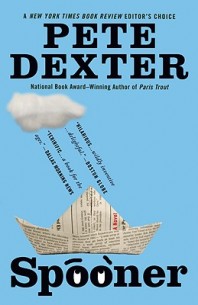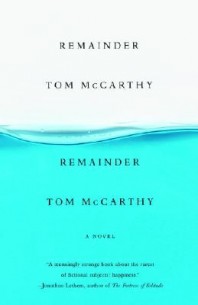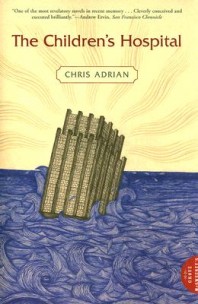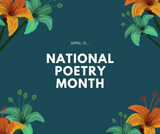 If you’re reading something on a website called NW Booklovers, you’re likely to know what a shelf talker is. Just in case, though, here’s the definition given in a business dictionary: “Printed card or other sign attached to a store shelf to call buyers’ attention to a particular product displayed on that shelf. Also called shelf screamer.” We in the book biz don’t generally raise our voices, so I’ve never heard that last term. I can’t speak for other kinds of retail, mind you. Maybe there’s a lot of yelling about cable-knit trouser socks at Banana Republic.
If you’re reading something on a website called NW Booklovers, you’re likely to know what a shelf talker is. Just in case, though, here’s the definition given in a business dictionary: “Printed card or other sign attached to a store shelf to call buyers’ attention to a particular product displayed on that shelf. Also called shelf screamer.” We in the book biz don’t generally raise our voices, so I’ve never heard that last term. I can’t speak for other kinds of retail, mind you. Maybe there’s a lot of yelling about cable-knit trouser socks at Banana Republic.
At Island Books we use shelf talkers rather sparingly. That’s probably because we have the luxury of ample face-to-face time with our customers. They’ve come to expect a lot of personal rapport with the folks behind the counter, and we’ve come to expect it from them. We do occasionally like to highlight  a favorite title, and it’s always a pleasure when a short note gets someone to look in a new way at a book she might have skipped. I wrote one recently for a novel I almost missed, Spooner by Pete Dexter. I knew by reputation he was a writer worth reading, but the cover and the jacket description simply didn’t wow me or explain what made the story different from a thousand others. When it hit paperback I finally did more than glance at it, and the first pages wouldn’t let go. My recommendation went like this:
a favorite title, and it’s always a pleasure when a short note gets someone to look in a new way at a book she might have skipped. I wrote one recently for a novel I almost missed, Spooner by Pete Dexter. I knew by reputation he was a writer worth reading, but the cover and the jacket description simply didn’t wow me or explain what made the story different from a thousand others. When it hit paperback I finally did more than glance at it, and the first pages wouldn’t let go. My recommendation went like this:
“Holy cow, this is good. A boy grows into manhood with the help of his step-dad, starting out in the South and winding up on Whidbey Island; it’s largely about how men think and feel, and about how they struggle to express themselves, in a dark, funny, I-can’t-believe-he-said-that kind of way. Honestly, the story sometimes lurches and staggers like Frankenstein’s monster, but like him it’s also immensely strong and impossible to keep your eyes off of.”
 A little awkward, but hopefully powerful, like the book.
A little awkward, but hopefully powerful, like the book.
The shop where I used to work in the early aughts was tragically hip (and is now tragically closed), so the clientele was often too aloof to chat with the staff. The customers were keen on discovering the coolest new titles, though, so we relied heavily on shelf talkers there. They got their message across without any of that messy human interaction, and the buyers could pretend they’d found their gems all on their own. I must have filled a shoebox with all the recommendation cards I wrote in my five years there.
The most successful of my rec cards endorsed a single book, a novel that centers on a man who’s stumbled into a huge insurance windfall after an unexplained accident. He spends his time and money attempting to recreate the one moment in his life when he felt authentically himself, an otherwise forgettable incident when he glanced out a window while climbing a staircase. Though he’s not sure whether it’s a memory or a figment of his imagination, he embarks on ever more elaborate schemes to bring that moment back, constructing entire buildings and hiring actors to help him replay the scene again and again. Not exactly a traditional plot, but one that fascinated me. 
Accordingly, I spent way too much time trying to sum up my feelings about the book on a shelf talker, before hitting on the idea of writing a series of cards and stacking them on top of each other—my little way of recreating the narrator’s experience. The first two, now lost, gave a description much like the one above, while the next pair I still have:
“Is there a sound or idea you can’t get out of your head? Science describes that as ‘cognitive itch.’ In German they call it ohrwurm (earworm). In Portuguese they refer to chiclete de ouvido, or ear chewing gum. The English version is Remainder by Tom McCarthy.”
“This isn’t like any other novel. In fact, it may not even be a novel. Emily Dickinson once wrote, ‘If I feel physically as if the top of my head were taken off, I know that is poetry.’ Remainder doesn’t rhyme or anything, but that sums it up pretty well. Reading it should give your brains a good stirring.”
 I wrapped up with one that promised readers they’d understand why I’d filled out so many cards if they ever read the book. Whether it was my words or my obvious obsession that did the trick, Remainder became the third-bestselling book in the whole store during my tenure. A bronze medal finish behind the dominant one-two punch of Harry Potter isn’t bad for an obscure, avant-garde novel about nothing in particular.
I wrapped up with one that promised readers they’d understand why I’d filled out so many cards if they ever read the book. Whether it was my words or my obvious obsession that did the trick, Remainder became the third-bestselling book in the whole store during my tenure. A bronze medal finish behind the dominant one-two punch of Harry Potter isn’t bad for an obscure, avant-garde novel about nothing in particular.
As you can see, I tend to say too much about the books I really like, which is a problem when I’m trying to fit my opinions onto an index card. My continuing aim is to write shelf talkers that are short and sweet but still tell a prospective reader something useful, and I think I came close to the mark when I described Jonathan Safran Foer’s Extremely Loud and Incredibly Close as being “as sad as an elephant graveyard and as funny as milk up your nose.” I’m not sure that even makes sense if you think about it too hard, but the whimsical, crackpot logic of it seemed to match Foer’s tone.
When Chris Adrian wrote The Children’s Hospital, a meticulous depiction of a young doctor’s work in a pediatric facility that’s also an off-the-wall fable about an apocalyptic flood and a fantastic ark that sails an endless sea, I tried to convince my customers that the novel “blends pickles and ice cream and  makes them taste good.” Not something for everyone, but a number of people developed a craving for it.
makes them taste good.” Not something for everyone, but a number of people developed a craving for it.
One of the snappiest shelf talkers I remember came from a favorite secondhand shop, Seattle’s Mercer Street Books. See if you can guess what’s being recommended below:
“Boy meets girl. Girl gets pregnant. Uncle Fulbert has boy castrated. Girl becomes nun. Boy becomes monk. They exchange letters. We’ve all been there, right?”
The Letters of Abelard and Heloise, of course. Never before have the travails of medieval romance been more tartly distilled for today’s jaded appetites, and never since has my image of a book turned so quickly from stodgy to edgy. It’s amazing, especially to a prolix guy like me, to see how much can be accomplished in twenty-five words or less.
James Crossley, a bookseller and blogger at Island Books on Mercer Island, wonders how it is that as he gets older he grows more long-winded yet shorter of breath.



James.
John Barth, a review of whose work was the first place I encountered the word prolix, once opened an essay on the pleasures of reading a massive novel with the sentence “Much can be said for minimalism.”, which — how I loved him then — sent me into what I believe are called paroxysms of laughter. I’m not perfectly certain why I just told you that, but you’ll know what to do with it, being the only person in my acquaintance ever to use the word prolix without a gun to their head.* I enjoyed this article. Never heard of shelf talkers before (could have used the phrase in my Mitchell piece recently; rats), and you make a great point about why MIB doesn’t use them much, but you might be losing opportunities from people who just can’t bring themselves to ask for guidance. Just sayin’. I’m off to read your LeGuin piece. She’s one of my favorites.
*Yes, I use the singular possessive form of “they”. Jane Austen did it. Somerset Maugham did it. Hopefully this doesn’t mean it’s all off between us.
Matt, you may be right about us using more shelf talkers at Island Books. I’m going to share your suggestion with my less verbose colleagues.
I’ve never written a recommendation card for John Barth, although I probably should. I’ve been a fan ever since high school when I went off the syllabus and hacked through the unassigned jungle of my Norton Anthology of American Literature. Reading Barth’s “Lost in the Funhouse” was like encountering a vine-covered temple left by an advanced alien civilization, a building and a machine all at once. The artistry! The technique! Was it really bigger inside than out? I didn’t know you could use words to make something like that.
Hey, I think I just started a new shelf talker.
There you go. And if you start at ‘Reading’ it’s a tidy 50 words, 49 if you count vine-covered as one.
Nice piece, James! It is usually very hard for me to fit a review/recommendation onto a shelf talker. I really like the idea of not saying much, or anything, about the plot of the book and just writing how it made you feel, or what you liked about it. Our customers always ask “What is it about?” Do you have that problem? I hate that question! I dislike it as a bookseller AND as a writer.
I think I actually wrapped up one of my recs with “Just read the book already!” or something like that. Probably not my most brilliant thought. Sometimes I get frustrated trying to encapsulate a book that is just SO excellent, and I just want to grab the customer and thrust the book at them.
Thanks, Amanda. I agree that the what of a book is usually much less important than the how. How does the author say what she has to say? How does the book make you feel when you read it?
Shelf talkers aren’t academic criticism or even book reviews, really, so I think “I loved this!” is a perfectly appropriate recommendation.
Hi James,
Thanks for your kind comments about the Abelard & Heloise shelf talker, which I had the pleasure of writing for Mercer Street Books.
If I had to give one piece of advice about how to write shelf talkers, it’s this: Address the main thing that’s preventing the most likely customers from wanting to read the book.
First, who’s the person finding or rediscovering the book? Absent the card, what would be that person’s main misconception?
In the case of A&H, if you just picked it up and read the back cover, you’d see “tragic love affair” and “medieval romance” and all that. Here, the main barrier to purchase is the presumption that a historical work about a monk and a nun has nothing to say to someone living in the contemporary world. The shelf talker puts the story into familiar terms.
Don’t repeat what the back cover says, or say that you like or even why you like it. Instead, focus on what’s keeping someone from buying it, and overcome that objection somehow.
So, for example, if I were doing a shelf talker for “War and Peace,” I’d lay off the genius of Tolstoy and all that and instead promise the reader that the thousand-plus pages (i.e., the potential buyer’s main objection) will fly by, and that you’ll probably finish way before your beard reaches Tolstoyan dimensions.
Still, there’s no exact formula, I’ve done other shelf talkers that look nothing like this. It’s like writing jokes, where the punchline is “buy the book.”
Ivan
Ivan, that’s an excellent seminar on writing shelf talkers. Couldn’t have said it better (or shorter) myself.